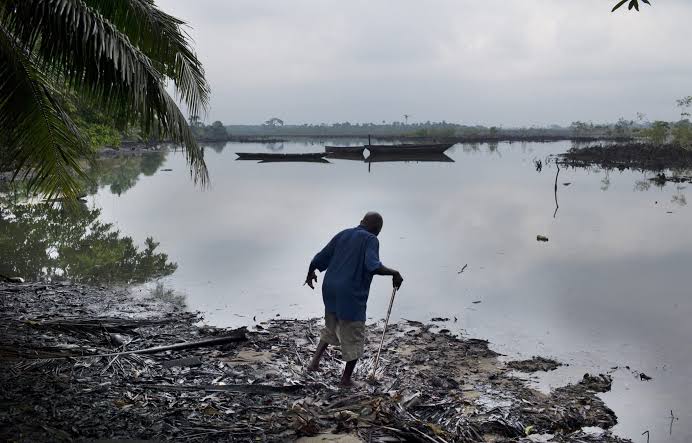An Environmentalist, Mr Furoebi Akene, has alleged that the dead fishes littering Niger Delta coastline were caused by the discharge of toxic chemicals from Shell’s operations at Forcados Oil Export terminal.
SEE ALSO: Low Oil Prices: Expert Wants Govt. to Focus on Fiscal Policies to Strengthen Economy
Akene, who is the Chairman, Board of Trustees, Centre for Environmental Preservation and Development (CEPAD), said this in an interview with the News Agency of Nigeria (NAN) on Monday in Yenagoa.
Akene was reacting to the position of National Oil Spill Detection and Response Agency (NOSDRA) that there was no oil spills linking the massive death of fishes floating near the Atlantic coastline in Delta, Bayelsa, Rivers and Akwa Ibom.
Agreeing with NOSDRA that the dead fishes were not caused by oil leakage, he said the disclosure was capable of misleading conclusions as the investigation results were being awaited by stakeholders.
Akene said that Shell Petroleum Development Company (SPDC) always discharged toxic materials in the Atlantic off Delta coastline at Ogulagha.
“It has also become a common knowledge that, the SPDC discharges sludge mixed with chemicals into the waters of the Atlantic Ocean.
“The discharge through one of their waste disposals pipes from the Forcados Terminal around Ogulagha and not oil spill from any of the trunk line pipes conveying crude oil from the Forcados terminal is the problem.
“NOSDRA in its position shows it is making all efforts to downplay the act and divert attention.
“It is heart breaking and surprising that the Federal Government Regulation Agency, NOSDRA, is just waking up with a press release three months after,” he said.
“Not only the belated nature of the response, but the premature position while the results are awaited is intended to shield or conceal the real cause of the matter, the facility that caused it and the owners of the facility.
“This is quite unfortunate of a regulation agency. We are using this medium to appeal to NOSDRA to do the right thing as they are statutorily mandated to do,” he said.
Akene said that the governments, National and State Assembly members of the affected states, Delta, Bayelsa, Rivers, Akwa Ibom and Ondo should rise up to their responsibilities and pursue this matter to a logical conclusion for the lives of their citizens.
In a reaction, Mr Idris Musa, Director-General of NOSDRA, dismissed the claims and restated the agency’s commitment to its mandate and strigent regulation of the maritime domain within Nigerian territorial waters.
Musa told NAN that NOSDRA was coordinating a multi-agency investigation aimed at unraveling the cause of the massive death of fishes within the nation’s territorial waters and was looking beyond the oil spill.
He said other regulatory agencies with mandates of safety in the maritime space, were deploying their expertise in the ongoing investigation, assuring that the process was being carried out with best practices.
“The death of fishes in large numbers make it expedient to look beyond oil spillage as the likely cause, as we found no trace of oil leakage to link with the dead fishes.
“The agency proceeded to collect samples of water, sediments and some of the dead fish for laboratory testing.
”In doing so, the agency brought onboard other relevant agencies of government that have mandate on our territorial waters.
“In particular, the Nigerian Maritime Administration and Safety Agency (NIMASA), Nigerian Instutue of Oceanography and Marine Research (NIOMR), Federal Institute of Fisheries Research and National Environmental Standards and Regulations Enforcement Agency (NESREA).
”This is for an all hands must be on deck in assessment of the possible cause or causes of death of the fishes in such large numbers,” Musa said.
The NOSDRA director-general, said that the results of ongoing laboratory analysis would be compared with results from the participating agencies to profer effective solution and ensure stringent regulations in future.
He said it was situations like this that informed the agency’s limitations to the use of chemical dispersants in the water bodies near human settlements.
Musa said that NOSDRA remained committed to a sustainable environment.
However, the Public Affairs officials of Shell declined comments when contacted on the allegations of discharging toxic chemicals from its operations at Ogulagha.
An email request for comments to the oil firm on April 7 has yet to be responded to.

